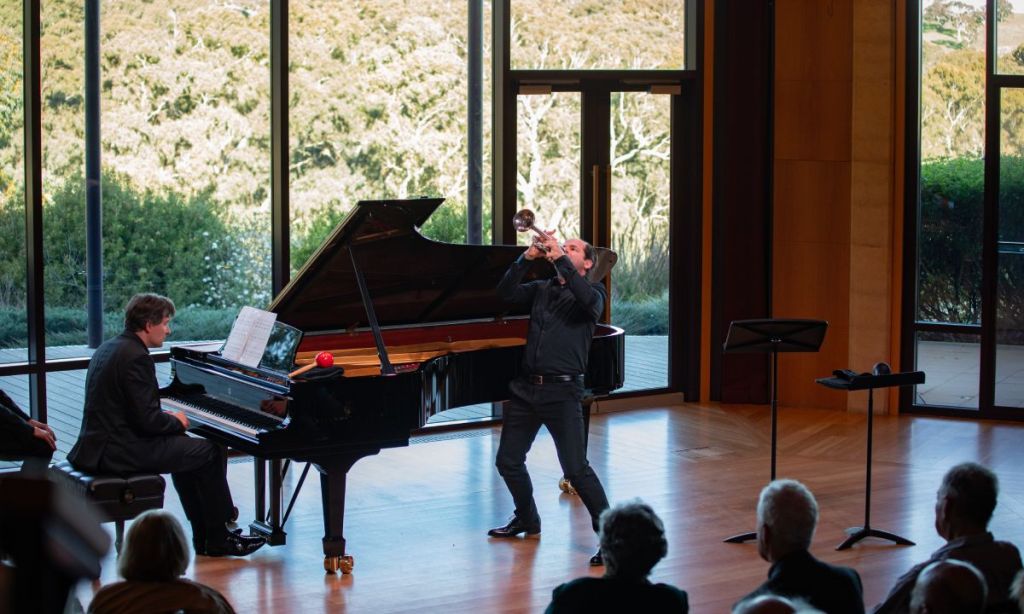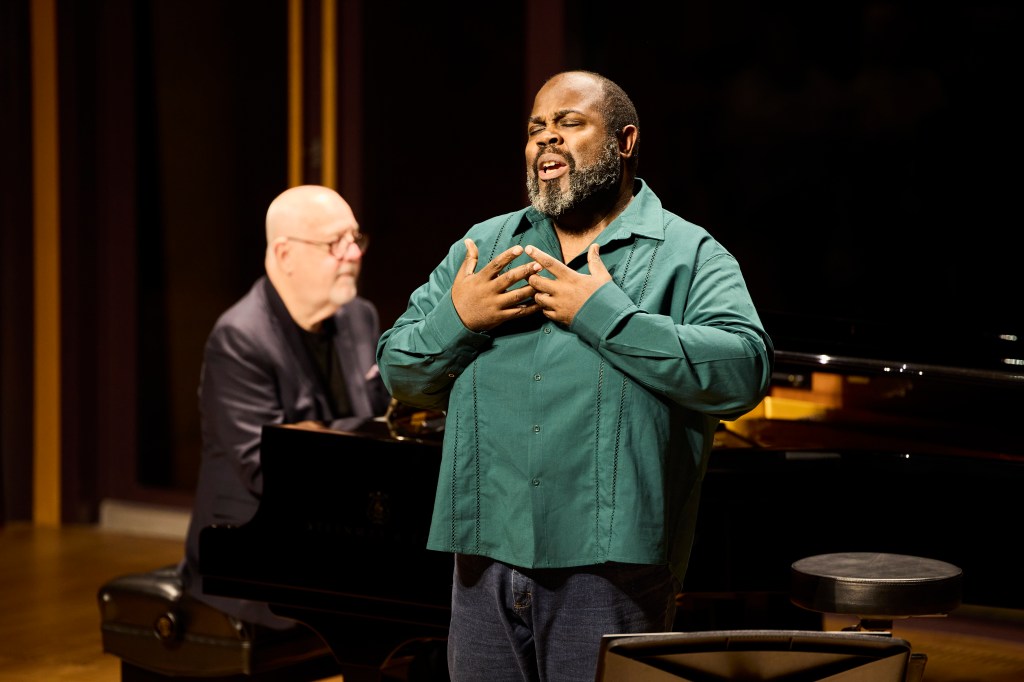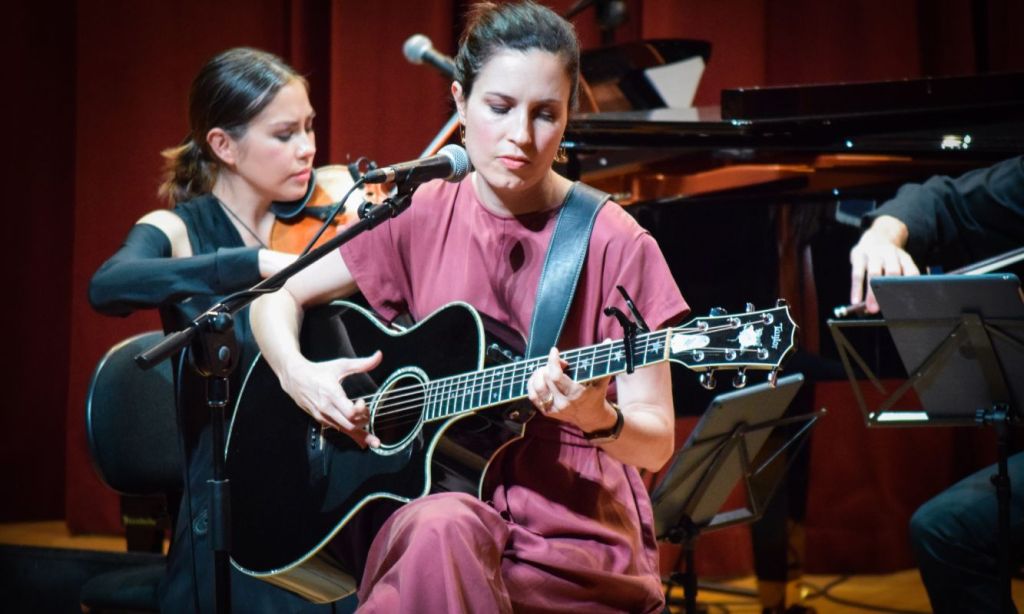‘It truly is music in nature’: UKARIA celebrates milestone anniversary
As UKARIA Cultural Centre marks its 10th birthday, CEO and artistic director Alison Beare reflects on how founder Ulrike Klein’s dream of an intimate chamber music concert hall has evolved into a world-class space in a unique Adelaide Hills setting.

It’s been a decade since the UKARIA Cultural Centre first opened its doors, an architecturally designed 220-seat venue purpose built for chamber music and perched in a scenic Mount Barker location.
It was the brainchild of Ulrike Klein, who wanted to create a special place that would attract artists from both Australia and around the globe, and embody her love of music and nature.
Klein had run a series of classical chamber music concerts in the 1990s, hosted in a small, 110-capacity building on the Jurlique farm. When that space became too small and rundown, she seized on the opportunity to build a state-of-the-art, yet disarmingly intimate concert hall in the heart of Mount Barker.
From the outset, UKARIA has always been about connecting world-class artists with Adelaide audiences but, importantly, that connection takes place against a backdrop of nature, achieved through the spectacular orientation of the building.
Designed by Anton Johnson Architect, UKARIA was designed with a nine-metre-wide, four-metre-high double-glazed glass wall behind its stage, embedding the musical experience in the surrounding landscape.

UKARIA’s CEO and artistic director Alison Beare says UKARIA’s success lies as much in the sensory experience of nature, music, art and culture that envelopes visitors as its world-class acoustics.
“The garden was very important in the initial vision for UKARIA,” Beare says. “You walk up through the garden and then you enter the hall, and that whole garden experience is part of getting ready for the performance. So it’s unique, it’s nothing like going to a city concert hall.”
Visual artist Winnie Pelz came up with the conceptual garden design which allows visitors to enter from various points. Its garden beds include roses, lavender, flowers and herbs, as well as water features, art works and other flora and fauna. Visitors can meander and discover the curated gardens and spaces such as “The Meeting Circle”, “The Crescendo Garden”, “The Mediterranean Garden”, and the “Santa Rosa Labyrith” which leads to the soaring “Sound and Space” portal sculpture by artist Luke Zwolsman. Over the years, the Garden Terrace has also been built where visitors can enjoy light meals as they take in the surrounds.
You might like
"It’s unique, it’s nothing like going to a city concert hall."
Winding paths gently guide visitors to the main attraction, where the concert hall’s natural light and ventilation, warm timbers, rammed earth walls and soaring glass backdrop blur the lines between inside and out.
“It’s located quite high, but still looking up to the Mount Barker summit, and it has that vast front which means that when you’re sitting in a concert during the day – and a lot of our concerts are during the day – you look out into nature and you can see the weather change,” Beare says.

“You can also see flocks of birds fly by, you see the changing light, the pink sunset, or a storm. So you have these other experience which the music really plays into and enhances. It truly is music in nature, but you’re sitting in a hall, you’re warm, you’re comfortable, you’ve got exquisite acoustics, but you almost feel like you’re sitting outside.”
Since UKARIA first opened its doors in 2015, Klein and Beare have traversed the globe looking for just the right artists to play in this intimate space.
“Ulrike as founder and myself have put a lot of energy and effort into searching nationally and internationally, going to Europe and the UK, and meeting artists and going to festivals and really listening,” she says. “Then inspiring those artists to make the journey to Australia and finding collaborative partners here, other venues who can also put those artists on. We can’t do it all on our own, obviously, with the 220-seat venue.
“But that has really reaped its rewards, because now, amongst many of the international artists, especially in the classical area, UKARIA is well known, and so they speak to each other, and now many more opportunities are presenting themselves to us.

“Artists are really wanting to come and perform at UKARIA and that I think will only build because we have no intention of slowing down or stopping what we’re doing.”
Artists are also able to stay at the nearby Twin Peaks property, a space for artistic residencies, and for international performers in particular, to experience this uniquely Australian site.
“Some of them are coming to Australia for the first time,” Beare says. “They land in Adelaide, drive up to the Adelaide Hills and arrive at this absolutely beautiful property. It’s 100 acres, and there’s kangaroos, eagles, there’s an amazing view, and suddenly they’re in the middle of the Australian landscape.
Subscribe for updates
“Then they’re playing in a hall that has incredible acoustics, and a Steinway concert grand piano and so they’re playing in the sort of environment that they would be used to in venues in Europe and the UK and America.”
From its original chamber music focus the venue’s programming has expanded organically over the years to include more contemporary artists. These include Vika and Linda Bull, James Morrison, and Paul Grabowsky, who curated a concert series entitled ‘Four Voices” in 2017 with concerts by singers Lior, Vince Jones, Kate Ceberano and Megan Washington.
“They have to be artists who can really carry themselves in an intimate setting,” Beare says. “It’s quite a different experience. It’s almost like an unplugged concert. Of course, they’re amplified, but it’s very different from playing in a 5000 seat venue where everything’s black and you don’t see the audience.
“When you walk out onto the stage at UKARIA the audience is right in front of you and they’re listening intently. And for some artists that can be quite confronting. So, we’re just careful to make sure that we choose the right ones.
“What’s been very inspiring for me about that is that good music is good music, great artists are great artists. What genre they play is kind of irrelevant, and it’s been wonderful to see the audience really embrace that. So you know, audiences that have been coming for many years, who love classical music, have been curious to see what these other concerts are offering in that same space and that intimacy.”
Another contemporary concert which was a particular highlight for Beare was singer Missy Higgins.
“Sitting at the piano with [composer and musician] Iain Grandage and string players around her, and just to hear her songs delivered like that, it felt like she was speaking just to you,” she says.

“It was something incredibly powerful and what a gift. Missy Higgins usually plays to thousands of people, and you don’t get to have that intimate connection with an artist like her.”
Over the past 10 years, UKARIA has gone from hosting 10 concerts a year to around 50. Beare says this is due to Klein’s total commitment to supporting music and culture in this country.
“I think it’s remarkable what she’s achieved,” she says. “We feel very lucky to have her here in South Australia.”
To commemorate the 10th anniversary, UKARIA is presenting three sold-out concerts which encompass the diversity of UKARIA’s programming and artistic relationships.
Featured artist, violinist Pekka Kuusisto, will curate the Friday and Sunday concerts in collaboration with UKARIA, while the Saturday concert will be curated by Kate Miller-Heidke and Iain Grandage.
“They will be joined by some of Australia’s finest musicians, and it will be an opportunity to hear almost all of the unique collection of rare and fine instruments played together for the first time,” Beare says.
In a statement she read at the opening ceremony on August 29, 2015, Klein’s words ring true 10 years down the track: “UKARIA is a place born out of a daring dream, holding music at its heart, ever evolving and expanding its boundaries to create pathways into the future.”
UKARIA’s 10th Anniversary Celebration runs from August 22 – 24
Want to see more stories from InDaily SA in your Google search results?
- Click here to set InDaily SA as a preferred source.
- Tick the box next to "InDaily SA". That's it.
Free to share
This article may be shared online or in print under a Creative Commons licence

